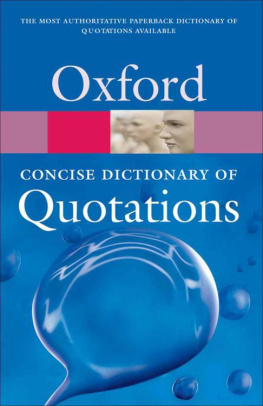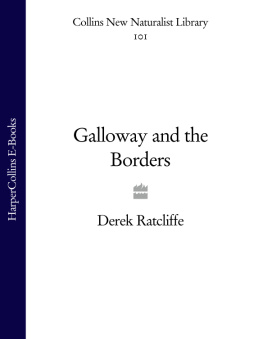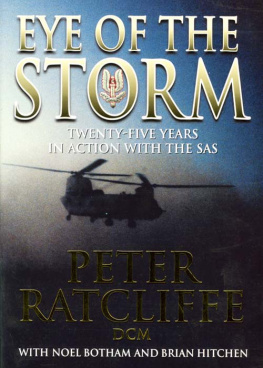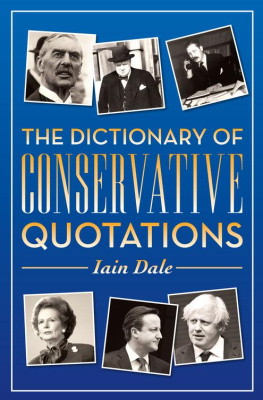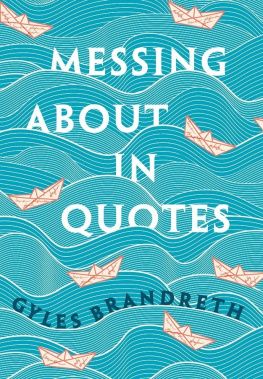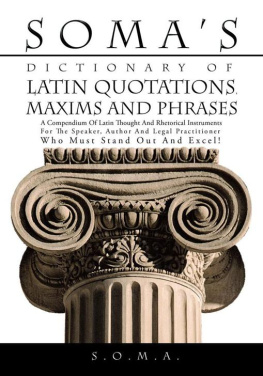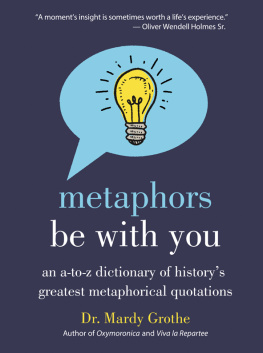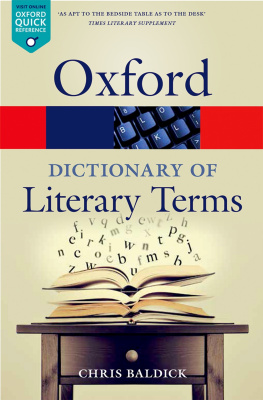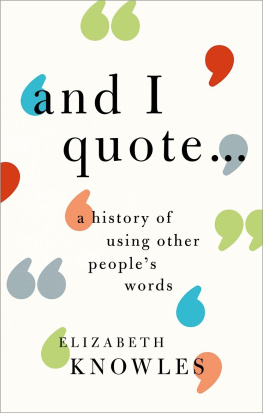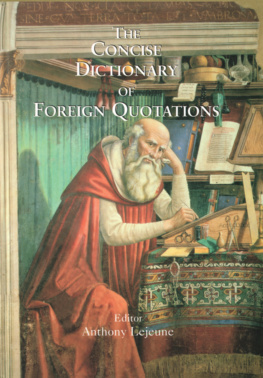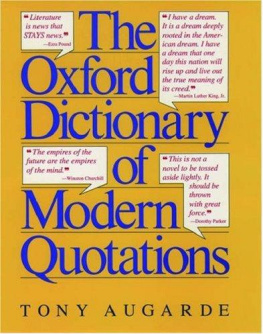OXFORD PAPERBACK REFERENCE Concise Oxford Dictionary of Quotations Susan Ratcliffe is an Associate Editor for Oxford Quotations Dictionaries. Her previous publications include the Little Oxford Dictionary of Quotations, the Oxford Dictionary of Phrase, Saying, and Quotation, and the Oxford Dictionary of Quotations by Subject.
Concise Oxford Dictionary of Quotations
FIFTH EDITION
Edited by SUSAN RATCLIFFE


Great Clarendon Street, Oxford OX2 6DP Oxford University Press is a department of the University of Oxford. It furthers the Universitys objective of excellence in research, scholarship, and education by publishing worldwide in Oxford New York Auckland Cape Town Dar es Salaam Hong Kong Karachi Kuala Lumpur Madrid Melbourne Mexico City Nairobi New Delhi Shanghai Taipei Toronto With offices in Argentina Austria Brazil Chile Czech Republic France Greece Guatemala Hungary Italy Japan Poland Portugal Singapore South Korea Switzerland Thailand Turkey Ukraine Vietnam Oxford is a registered trade mark of Oxford University Press in the UK and in certain other countries Published in the United States
by Oxford University Press Inc., New York O.U.P. 1993, 1997, 2001, 2003, 2006 The moral rights of the author have been asserted
Database right Oxford University Press (maker) First edition published 1964
Second edition published 1981
Third edition published 1993
Revised third edition published 1997
Fourth edition published 2001
Revised fourth edition published 2003
Fifth edition published 2006 All rights reserved. No part of this publication may be reproduced, stored in a retrieval system, or transmitted, in any form or by any means, without the prior permission in writing of Oxford University Press, or as expressly permitted by law, or under terms agreed with the appropriate reprographics rights organization.
Enquiries concerning reproduction outside the scope of the above should be sent to the Rights Department, Oxford University Press, at the address above You must not circulate this book in any other binding or cover and you must impose this same condition on any acquirer British Library Cataloguing in Publication Data
Data available Library of Congress Cataloging in Publication Data
Data available ISBN13: 9780198614173
ISBN10: 0198614179 Typeset by Interactive Sciences Ltd, Gloucester
Printed in Great Britain
on acid-free paper by
Clays Ltd, St Ives plc
CONTENTS
INTRODUCTION
This fifth edition of the
Concise Oxford Dictionary of Quotations is based on the latest (sixth) edition of the
Oxford Dictionary of Quotations, published in 2004. With yet more quotations from a wider range of sources to choose among, the task of abridging for the present text might seem to have been an even greater challenge than for previous editions. Fortunately for this edition we have had the invaluable assistance of a new resource: the Oxford English Corpus, a database of examples of English speech and writing. The Corpus was set up as a tool for the OUP dictionaries programme, and while it was designed primarily to examine the frequency of single words and the contexts in which they are used, it has also proved possible to use it to establish a guide to the frequency of occurrence of individual quotations. For the first time, therefore, we have been able to identify on a more statistical and scientific basis those quotations which are most likely to be encountered. Since these quotations are those about which the reader is most likely to enquire, that information has been of great value in preparing this book.
Reassuringly, in many cases the frequency analysis has simply confirmed what was already received wisdom: Shakespeare and the Bible are indeed widely quoted. But it was particularly noticeable that while quotations from well-known plays such as Macbeth or Hamlet scored very highly, quotations from the minor plays were used much less. This reflected a general trend: that the words of famous people were more frequently quoted than those of obscure authors. Clearly people want to be able to say As Churchill said, and expect their audience to identify the speaker without having to embark on further explanation. Traditional literary figures such as Jane Austen, Dickens, and Tennyson retain their place, and are joined by more quotations from major scientists, artists, and politicians. Areas which proved to be generally under-represented included songs and poetry, and, interestingly, North American culture.
It is also clear that what might be described as inspirational and motivational quotations are particularly popular. Material from the seventeenth and eighteenth century (apart from the very famous authors), minor nineteenth-century poets, the earlier part of the twentieth century in general, and people of all periods who are no longer well-known had a much lower recognition factor. As a result, this book is very different from the previous edition, with more than 20% new material, and it should provide a closer guide to the quotations which are actually being used today than any other dictionary. New quotations inherited from the latest sixth edition of the Oxford Dictionary of Quotations include Integrity has no need of rules (Albert Camus), Courage is the price that Life exacts for granting peace (Amelia Earhart), Nothing great was ever achieved without enthusiasm (R. W. Emerson), and Trifles make perfection, and perfection is no trifle (Michelangelo).
New North American material ranges from the recent, such as the actor Michael J. Fox on his fight against Parkinsons disease Its all about losing your brain without losing your mind and President George W. Bush on the axis of evil, to classic items such as William Lyon Mackenzie Kings Not necessarily conscription, but conscription if necessary and Mark Twains Few things are harder to put up with than the annoyance of a good example. Some newer quotations have come into prominence since the publication of the Oxford Dictionary of Quotations, and so you will find here amongst others John Prescotts comment on what happens when plates appear to be moving and Donald Rumsfelds remark on looting in Iraq: Stuff happens. Whether you believe with Thomas Carlyle that A good book is the purest essence of a human soul or merely agree with Pliny that there is no book so bad that some good could not be got out of it I hope you will find something here for you.
Acknowledgements
The book depends heavily on the work done for the
Oxford Dictionary of Quotations, and thanks are due to all those who contributed to the sixth edition.
Acknowledgements
The book depends heavily on the work done for the
Oxford Dictionary of Quotations, and thanks are due to all those who contributed to the sixth edition.
I should like to thank especially Elizabeth Knowles, Publishing Manager for Oxford Quotations Dictionaries, for help and advice throughout the editing of this volume, and James McCracken, Project Manager, English Dictionaries, for setting up and advising on the Corpus software. SUSAN RATCLIFFE
Oxford 2005
HOW TO USE THE DICTIONARY
The sequence of entries is by alphabetical order of author, usually by surname but with occasional exceptions such as members of royal families (e.g.
Diana, Princess of Wales and
Elizabeth II), or authors known by a pseudonym
Next page
